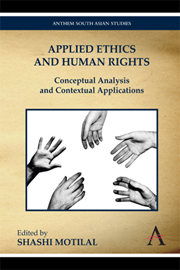Book contents
- Frontmatter
- Contents
- Preface
- Introduction
- Part One Rights, Obligations and Responsibilities
- 1 Applying Ethics: Modes, Motives and Levels of Commitment
- 2 Jurisprudence and the Individual: Bridging the General and the Particular
- 3 Why Moral Relativism Does Not Make Sense
- 4 Human Rights – A Theoretical Foray
- 5 Moral Relativism and Human Rights
- 6 Complicity and Responsibility
- 7 Dharma: The Overriding Principle of Indian Life and Thought
- 8 Moral Foundations of Social Order as Suggested in the Vaiśeṣikasūtras
- 9 Modern Western Conception of Justice as Equality before the Law and Dharmaśāstras
- Part Two Human Rights Issues
- Notes on Contributors
4 - Human Rights – A Theoretical Foray
from Part One - Rights, Obligations and Responsibilities
Published online by Cambridge University Press: 05 March 2012
- Frontmatter
- Contents
- Preface
- Introduction
- Part One Rights, Obligations and Responsibilities
- 1 Applying Ethics: Modes, Motives and Levels of Commitment
- 2 Jurisprudence and the Individual: Bridging the General and the Particular
- 3 Why Moral Relativism Does Not Make Sense
- 4 Human Rights – A Theoretical Foray
- 5 Moral Relativism and Human Rights
- 6 Complicity and Responsibility
- 7 Dharma: The Overriding Principle of Indian Life and Thought
- 8 Moral Foundations of Social Order as Suggested in the Vaiśeṣikasūtras
- 9 Modern Western Conception of Justice as Equality before the Law and Dharmaśāstras
- Part Two Human Rights Issues
- Notes on Contributors
Summary
A commitment to human rights is something that all contemporary nation states are united by. No regime would like to be thought of as being opposed to human rights, all portray themselves as champions of human rights. Clearly it appears that human rights are very desirable and ought to be defended. The only murmur of disagreement comes from political theorists. This is ironical, for here is a concept that all practitioners of politics would like to identify with. And yet this is a concept not accepted uncritically by the theorists of politics. (Susan Mendus in David Beetham, 1995)
The extent of this philosophical scepticism can be gauged from the comparison that A. MacIntyre makes of human rights with unicorns and witches! (MacIntyre, 1981) This rather provocative comparison indicates the existence of very profound objections to the whole concept of human rights. However in the bulk of contemporary western political theory there is an acceptance of the concept of human rights although there are debates regarding the content of these rights. (Barry, 1992) The most obvious example would be the differences between the libertarians who see an almost insignificant role for the state, where individuals have rights whether or not recognized by the legal system, and the positive liberals who would insist that the state play a greater role in the regulation of the economy and the society in order to secure human rights.
- Type
- Chapter
- Information
- Applied Ethics and Human RightsConceptual Analysis and Contextual Applications, pp. 57 - 66Publisher: Anthem PressPrint publication year: 2010



